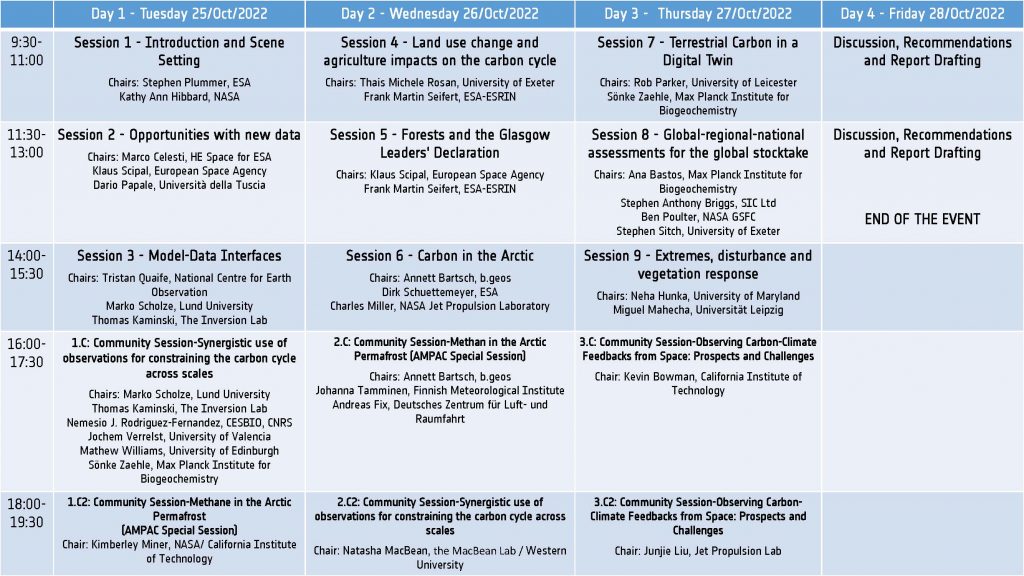Organised by
The European Space Agency (ESA), in collaboration with Global Carbon Project, CEOS, NASA and the European Commission, is organising the 4th Carbon from Space Workshop to bring together the EO, in situ and Earth system science communities to identify gaps, challenges and issues to address in understanding the carbon cycle. The workshop, this time, will focus specifically on the terrestrial component of the carbon cycle and its interactions with the ocean and atmosphere.
Background
Since the 3rd Carbon from Space workshop in Exeter in 2016, the efforts to implement the Committee on Earth Observation Satellites (CEOS) Carbon Strategy1 have led to detailed plans for new satellite launches including, in particular, BIOMASS, NISAR, FLEX, GEDI, all with potential to address specific gaps in data and understanding of the carbon cycle. In addition, effective institutional arrangements for realisation of the Integrated Carbon Observing System have started to take shape2 and the establishment of improved or better coordinated in situ networks (NEON, ICOS, TERN, FOS3 etc), as well as major improvements in the availability and consistency of satellite observations e.g. through the Copernicus Sentinel series.
Significant improvements have also been made in the estimation of the global carbon budget, especially through the quantification and parameterisation of the terrestrial carbon balance (Friedlingstein et al. 20214) and advances have been made in the determination of the budgets of the two other major GHGs, methane (CH4) and nitrous oxide (N2O). However, such budgets, while they provide a global view and distribute the carbon by sector and region, are not sufficiently detailed for use in understanding regional or national carbon balance, especially in the terrestrial domain. There is, therefore, a pressing need to move further and faster, driven by the upcoming Global Stocktake process and the goal to limit global warming to well below 2, preferably to 1.5 degrees Celsius5, compared to pre-industrial levels as stated in the Paris Agreement. This requires that the knowledge base needs to improve in terms of process understanding but also consistency and quality of observation and prognosis across both time and space.
The European Space Agency (ESA), in collaboration with Global Carbon Project, CEOS, NASA and the European Commission, is organising the 4th Carbon from Space Workshop to bring together the EO, in situ and Earth system science communities to identify gaps, challenges and issues to address in understanding the carbon cycle. The workshop, this time, will focus specifically on the terrestrial component of the carbon cycle and its interactions with the ocean and atmosphere.
Objective
The objective of this workshop is to review progress against the recommendations of the 3rd Workshop6 (see Annex I for Summary) and establish a revised strategic plan of research and development activities to guide the programmatic actions and investments and related application development on terrestrial carbon research for the time frame 2023–2028.
The workshop completes the series of virtual meetings comprising the ATMOS2021 and Ocean Carbon from Space.
Abstracts submissions are now closed and the abstracts are under review by Session Leads
[1] CEOS (2014) CEOS Strategy for Carbon Observations from Space. The Committee on Earth Observation Satellites (CEOS) Response to the Group on Earth Observations (GEO) Carbon Strategy. https://ceos.org/home-2/the-ceos-carbon-strategy-space-satellites/
[2] Pinty, B., and et al., 2017: An operational anthropogenic CO2 emissions monitoring and verification support capacity: Baseline requirements, model components and functional architecture. European Commission Joint Research Centre, EUR 28736 EN, 98pp., https://doi.org/10.2760/08644.
[3] Schepaschenko, D., Chave, J., Phillips, O.L. et al. The Forest Observation System, building a global reference dataset for remote sensing of forest biomass. Sci Data 6, 198 (2019). https://doi.org/10.1038/s41597-019-0196-1
[4] Friedlingstein, P., Jones, M.W., O’Sullivan, M., et al. (2021), Global Carbon Budget 2021, Earth System Science Data, DOI: https://doi.org/10.5194/essd-2021-386.
[5] UNFCCC (2015) Decisions adopted by the Conference of the Parties: CP.21, FCCC/CP/2015/L.10 Available at https://unfccc.int/sites/default/files/resource/docs/2015/cop21/eng/l10.pdf. Accessed Oct 20, 2021.
[6] Report of the 3rd Carbon from Space Workshop, Exeter, Jan 2016. https://eo4society.esa.int/wp-content/uploads/2020/01/3rd-carbon-from-space-workshop-nbsp-report-.pdf
Venue location
ESA – ESRIN
Largo Galileo Galilei n. 1, 00044 Frascati (RM), Italy
Contacts
For information regarding the scientific programme and schedule information, please contact:
ENVMAIL@esa.int
For information regarding the logistics of the venue place, accommodation, shuttle bus and for any dietary requirements, please contact :
events.organisation@esa.int
Schedule and Deadlines
| Closure of the Proposal for Community Sessions | |
| Notification of acceptance for Community Sessions | |
| Abstract Submissions extended | |
| Notification of acceptance | end of August 2022 |
| Issue of Preliminary Programme | end of August 2022 |
| Registration Opening | end of August 2022 |
| Issue of Final Programme | at the Workshop |
| Workshop | 25 – 28 October 2022 |
Organizing Committee
Clement Albergel
ESA
Stephen Briggs
CEOS
Philippe Ciais
GCP
Matthias Drusch
ESA
Diego Fernandez
ESA
Kathy Hibbard
NASA
Neha Joshi
GISAT
Sabrina Lodadio
Serco c/o ESA
Charles Miller
NASA
Fabrizio Pera
ESA
Stephen Plummer
ESA
Ben Poulter
NASA
Irene Renis
Serco c/o ESA
Dirk Schuettemeyer
ESA
Klaus Scipal
ESA
Frank Martin Seifert
ESA
Ulla Vayrynen
ESA
Espen Volden
ESA
Mariette Vreugdenhil
TUW
Scientific Committee
Ana Bastos
Max Planck Institute for Biogeochemistry
Pep Canadell
CSIRO
Jadu Dash
University of Southampton
Matthias Disney
University College London
Matthias Forkel
Technische Universität Dresden
Nadine Gobron
EC-JRC
Martin Herold
Wageningen University & Research
Chris Jones
Met Office
Martin Jung
Max Planck Institute for Biogeochemistry
Thomas Kaminski
The Inversion Lab
Werner Kutsch
ICOS
Fabienne Maignan
LSCE
Ed Mitchard
The University of Edinburgh
Jose Moreno
Universitat de València
Dario Papale
UNITUS
Tristan Quaife
University of Reading
Uwe Rascher
Forschungszentrum Jülich
Nemesio Rodriguez
Université Toulouse III
Maurizio Santoro
GAMMA Remote Sensing
Dmitry Schepaschenko
IIASA
Marko Scholze
Lund University
Stephen Sitch
Università di Exeter
Sonke Zaehle
Max Planck Institute for Biogeochemistry


